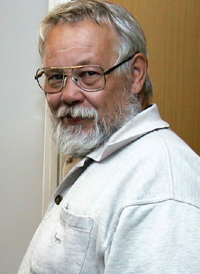Over 20 years of archival insight
By Matleena Oksman
Professor Pöntinen is a staunch supporter of the data archiveSeppo Pöntinen, Professor of Sociology at the University of Turku, is well acquainted with the activities of the data archive. He has closely followed the discussion on the establishment of the archive since the 1970's and was one of the protagonists in the twist with the University of Tampere over the location of the archive. When the archive finally, after 25 years of waiting, was established in Finland, Turku lost the fight. There are no hard feelings, though.
|
 |
Professor Pöntinen is the chairman of the advisory council of the FSD, an organ overseeing the operation of the archive with the purpose of making sure that the archive fulfils its nation-wide tasks and does not bother with parochial bickering.
- In the advisory council there are representatives from different universities, fields of science and the archives service, Pöntinen says.
- Its executive powers are relatively small. The council is one of the levels on which contacts between the archive and various instances of society take place. Through the advisory council the data archive disseminates information and the wishes of the outside world come to its attention.
Pöntinen is pleased about having a social scientific data archive in Finland. He finds it important that - thanks to the archive - it becomes easier to carry out longitudinal research.
- If the aim is that a study has a time dimension, one way to accomplish this is to repeat studies that have been carried out sometimes earlier.
Another important thing in Pöntinen's mind is that old material is stored in a re-usable form. Otherwise one would have to rely solely on previous research and articles written about them.
- When the material is in a binary form, new classifications can be made. New knowledge does not emerge from nothing. Some data can be classified in a different way to serve a new purpose.
- Decentralised depositing of material does not seem to work in our country. In principle, there are guidelines for storing but at university departments everybody knows that materials are being lost and destroyed.
Professor Pöntinen knows what he is talking about. In the 1970's he was responsible for the storing of the datasets from a Scandinavian Welfare survey. Almost for ten years everything went fine until one summer, making backup copies of the of tapes was forgotten and the materials were destroyed. Fortunately, the datasets were deposited in the Danish Data Archive as well, and they were found safe and sound there. A year ago they were returned to the FSD. According to Pöntinen, a similar fate has been the bane of the first big member survey of the Central Organisation of Finnish Trade Unions and who knows how many other datasets.
More effort expected from researchers
The data archive has been operating in Finland only for about two years. Even if the worst growing pains are over, there remain problems.
- I think that the biggest problem is that university researchers do not deposit their materials in the data archive. There are many reasons for this: one thinks that something may be lost or that datasets will be taken in use even if they have remained untouched for the last, say, five years.
- Another reason is that depositing datasets in the archive calls for certain measures to be taken. If the material is in the form of a computer file and the codebook is merely a form filled with indecipherable markings, it is not usable as such but needs work.
Professor Pöntinen thinks that researchers may have objections in principle, too.
- It is not believed that on the basis of data archive documentation the datasets could be used properly. There are samples which are not necessarily representative and this is known only be those who have collected the material. There are also codings which cannot be written in a form that could be understood by anyone who has not personally participated in the coding.
According to Pöntinen, depositing new materials in the data archive would call for only a bit of extra efforts by the researchers. On some level the question is about attitudes. In his view, a condition for a project's financing could be that at some stage after the completion of a research project the material would have to be handed over to the archive.
Apart from storing datasets the archive plays an important role also in method studies. The archive could work on the materials to make them suitable for university teaching purposes.
- In method studies we have to rely on very different kinds of datasets. They become outdated and aren't necessarily optimal. The data archive could turn the datasets into a form which would enable linking to various method and analysis references, in other words, turn them into a hyperlink. It would serve us better.
Top of page | Privacy Policy
|